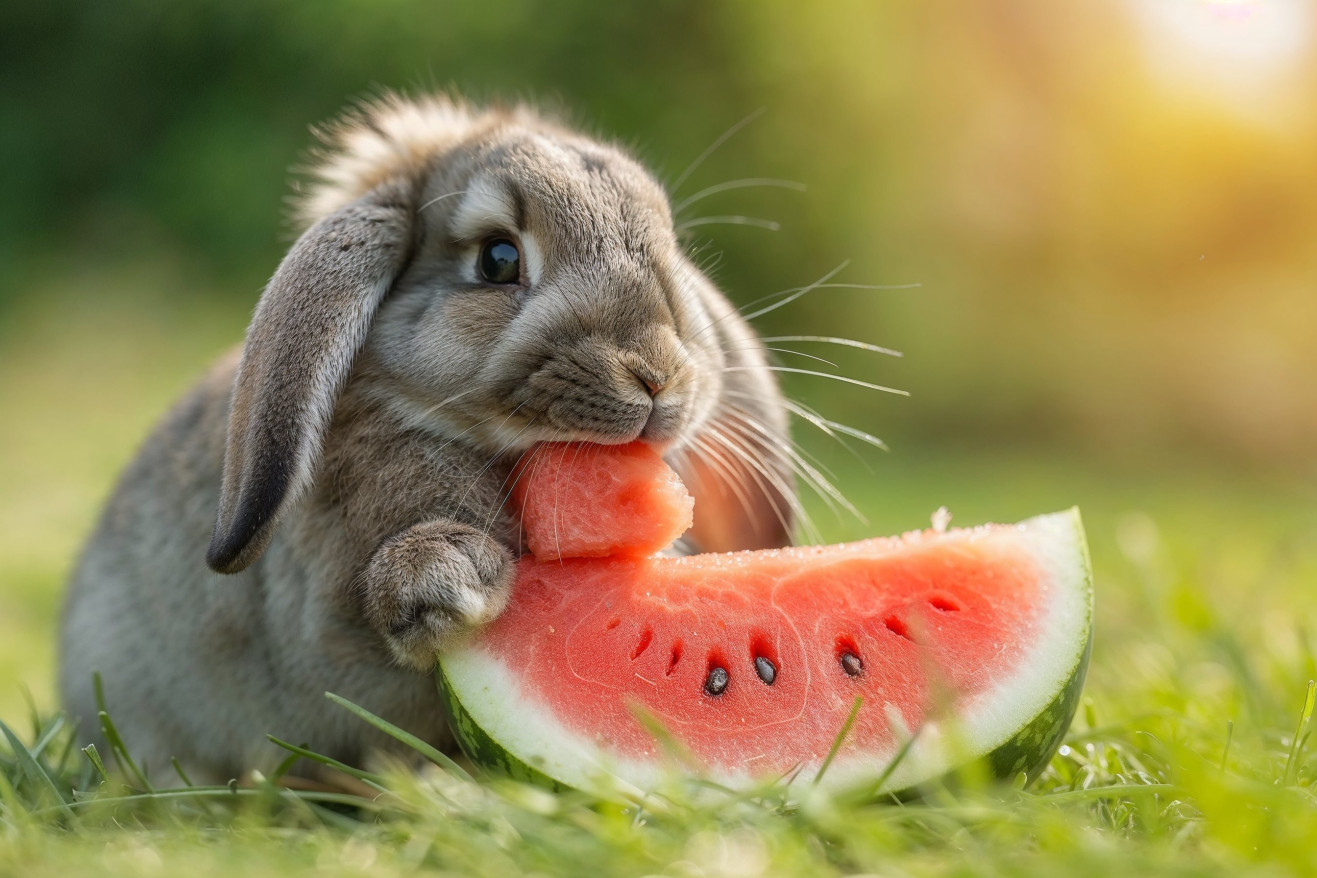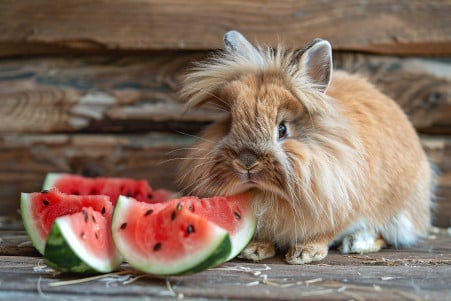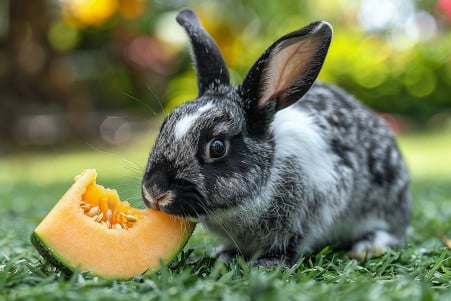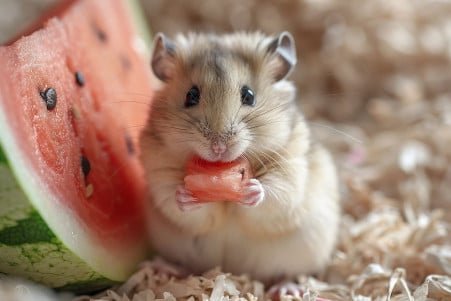Can Rabbits Eat Watermelon? Serving Up Safe Snacks
25 January 2024 • Updated 28 January 2024

Watermelon is a classic summer snack, but can you share it with your pet rabbit? Rabbits can eat watermelon as a treat, but it should be fed to them in moderation. You should only give your rabbit 1 tablespoon of seedless watermelon for every 2 pounds that they weigh. That said, because of the high sugar content, it’s not something that you should give to them regularly.
This article will combine veterinary advice, nutritional information, and animal dietary research to offer a complete picture of how to feed watermelon to rabbits. We will cover rabbit digestive systems, how much watermelon rabbits can eat, and the role of a rabbit’s diet. By the end of this article, you will have all the information you need to determine if watermelon can be an occasional part of your rabbit’s diet.
Can rabbits eat watermelon?
What Rabbits Need in Their Diet
Fiber is the most important part of a rabbit’s diet, and it’s essential for their digestive health. VCA Animal Hospitals explains that the foundation of a rabbit’s diet is unlimited high-quality grass hay, like timothy or orchard hay, which provides the fiber that rabbits need to keep their digestive systems moving.
Fresh vegetables and a small amount of pellets, which are portioned based on the rabbit’s weight, help to fill in the rest of the rabbit’s nutritional needs.
While it’s important to make sure that a rabbit’s diet is well-rounded, it’s also important to make sure that they’re not getting too many treats. RSPCA warns that root vegetables and fruits should be fed to rabbits in moderation because they’re high in sugar. If rabbits eat too many sugary treats, they can become overweight and develop other health problems, which can throw off the balance of their gut microbiome.
In addition to helping rabbits maintain a healthy weight, a well-rounded diet also helps rabbits maintain their overall health. For example, rabbits’ teeth are kept in check by their constant need to chew on fibrous foods.
This means that a diet that’s similar to what rabbits would eat in the wild, which is made up mostly of grasses and leafy greens, is essential to their health, according to the Merck Veterinary Manual. By making sure that they understand these dietary needs, rabbit owners can make sure that their pets are set up for a long, healthy life.
Watermelon’s Nutritional Content and How It Affects Rabbits
Watermelon is made up of mostly water, so it can help hydrate rabbits, but its sugar content can be harmful. According to Healthline, a 100-gram serving of watermelon has 30 calories, 7.6 grams of carbohydrates, and 6.2 grams of sugar.
The sugar in watermelon is made up of simple sugars, including glucose, fructose, and sucrose. Watermelon has a high glycemic index (72–80), so even though it’s low in calories, it can cause a quick spike in blood sugar.
The fruit also has some nutritional value, including being a good source of vitamin C and containing some potassium, copper, vitamin B5, and vitamin A. These vitamins and minerals can be good for rabbits. However, the fructose in watermelon is a FODMAP and can lead to digestive upset or other problems in rabbits, especially those with sensitive stomachs.
When it comes to feeding watermelon to rabbits, it’s important to weigh the potential benefits against the potential drawbacks. While the water and nutrients in watermelon can be helpful, the sugar and high glycemic index mean it should be fed to rabbits with caution.
It’s important to make sure that any treat, especially one as sugary as watermelon, is appropriate for rabbits’ specific nutritional needs so that it doesn’t negatively impact their health and wellness.
How to Create a Healthy Treat Plan for Your Rabbit
When it comes to rabbit treats, the most important thing is that they are safe. A safe treat is one that doesn’t throw off the rabbit’s diet of hay, fresh vegetables, and a small amount of pellets in terms of nutrition or digestion.
According to Small Pet Select, the natural sugars in fruits are fine for rabbits as long as they are given in small amounts and treated as a special treat rather than a regular part of the diet.
When you’re introducing treats like watermelon, it’s important to do it slowly. Vets recommend starting with a small piece, no bigger than a teaspoon per 2 pounds of rabbit. This will help prevent digestive issues and give you time to see if there are any negative side effects.
There are also risks associated with overfeeding treats. These include weight gain, obesity, and dental issues. This is because the sugars in treats can change the bacteria in the gut and cause the production of acids that can damage the teeth. This is why it’s important to stick to the recommended serving sizes and only give treats occasionally.
Make sure you’re choosing the right treats by reading labels and avoiding treats with high sugar and dairy content, as suggested by Small Pet Select. By doing this and choosing treats that are made specifically for rabbits, you can make sure that your furry friend can enjoy their treats without any negative side effects.
How to Feed Watermelon to Your Rabbit
To make sure that you are keeping your rabbit safe and healthy, it’s important to introduce watermelon to their diet in a way that is safe and healthy. A-Z Animals suggests that you start by picking out a ripe, seedless watermelon and washing the outside to make sure that it’s free of any pesticides or other chemicals.
Then, cut a small piece of the fruit out, making sure that you remove all of the seeds to avoid a choking hazard. This piece should be no larger than your rabbit’s paw.
Give this piece to your rabbit and watch them for the next 24 to 48 hours to see if they have any adverse reactions. This could include digestive issues like diarrhea or a change in their eating habits. Rabbit Care Tips suggests that you watch your rabbit closely for any signs that they may not be tolerating the watermelon well.
If your rabbit eats the watermelon and doesn’t have any adverse reactions, you can consider giving it to them as a treat. However, it’s important to remember that treats should only make up 10% of your rabbit’s diet.
You can also make sure that your rabbit is getting a well-rounded diet and keeping things interesting for them by giving them a variety of treats, including different fruits and vegetables, to make sure that they are getting a variety of nutrients.
By following these steps and continuing to monitor your rabbit’s health, you can make sure that you are safely giving your rabbit watermelon as a treat on hot days, which can help keep them hydrated and happy.
Finding the Right Balance: The Role of Treats and Health Monitoring in Your Rabbit’s Diet
While treats can be a fun way to spoil your rabbit, it’s important to monitor their effect on your pet’s health. A study in ScienceDirect emphasizes the importance of water consumption in rabbits, which is directly related to healthy development.
While water-rich treats like watermelon can help with this, they need to be balanced with a diet that’s high in fiber to ensure that your rabbit is as healthy as possible. Regularly monitor your rabbit’s health when you introduce new treats to make sure that you catch any changes early on.
A study in PubMed found that high water intake is important in preventing uroliths, a common health issue in rabbits.
This means that treats that help with water intake can have a positive impact on urinary health if they’re given in moderation.
Make sure that you’re looking for signs of health in your rabbit, including regular eating and bowel movements and a normal level of activity.
On the other hand, if your rabbit seems lethargic, if their eating or bowel movements change, or if they show signs of gastrointestinal distress, it could be a sign that there’s a problem with their diet.
If you find that your rabbit’s health is suffering after you’ve introduced treats, it’s important to reevaluate their diet. You can help identify the problem and make changes by removing or reducing the amount of the new treat that you’re giving them and talking to a vet about the issue, as a study in PMC explains.
This will help ensure that the treats you’re giving your rabbit continue to be a healthy addition to their diet, helping to keep them happy and healthy without causing any disruptions.
Conclusion: Can Rabbits Eat Watermelon?
So, yes, rabbits can eat watermelon, but only if it’s given to them in moderation and with some caveats.
Make sure to remove the seeds and only give them a tablespoon of watermelon for every 2 pounds of their body weight to avoid the potential health risks associated with the sugar in the fruit.
Remember that a well-rounded diet that consists mostly of high-fiber hay, vegetables, and a small amount of pellets is still the most important thing for your rabbit’s health. While the hydration that watermelon can provide is a nice bonus, it should still be given in moderation due to its high glycemic index.
As we’ve discussed, whenever you introduce a new food to your rabbit, it’s important to do so with caution and monitor them for any signs of digestive issues. Regular vet visits will help ensure that your rabbit is healthy and thriving, which will allow you to give them treats like watermelon without throwing their diet out of whack.
So, for rabbit parents who are thinking about giving their pets watermelon, the bottom line is that it’s important to prioritize your rabbit’s overall dietary needs and work with a vet to get personalized advice based on your rabbit’s specific health needs. If you do this, you can enjoy sharing sweet treats with your rabbit without putting their health at risk.


